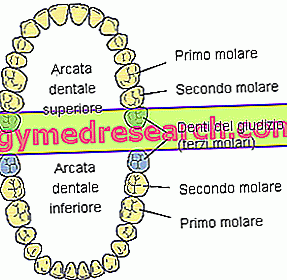What are they?
The wisdom teeth are the third - and last - molars that sprout in the dental arches. Also called octaves, wisdom teeth owe their singular name to the age in which they erupt through the gums: compared to the other teeth, those of the judgment are slow to surface to appear normally between 18 and 25 years, an age that - at least theoretically - it could be called "judgment age".

When do they appear?
The appearance of the four wisdom teeth establishes the completion of the permanent dentition: in normal conditions, each wisdom tooth occupies the last - as well as the innermost - position of each dental semi-arch.
However, the third molars do not always make their debut: it is not rare that one or more wisdom teeth, remaining embedded in the bone and gum, fail to appear. In such circumstances, the incomplete permanent dentition reflects a condition known as hypodontia (less than four wisdom teeth).
Other times, even though they partially succeed in erupting from the gingiva, wisdom teeth do not complete their development: in similar circumstances, the third molars, not finding sufficient space to complete their growth, remain anchored in the maxillary or mandibular bone. The incomplete development of wisdom teeth can, in turn, predispose to the formation of chronic inflammatory foci, so as to make it necessary to extract the disturbing tooth.
Why do they grow up?
It is now established that wisdom teeth are almost useless for chewing and smile aesthetics. The question that arises spontaneously is therefore the following: why do they grow?
To answer this question we must take a step back, and go back a few million years: wisdom teeth are a hereditary heritage that comes to us from the ancient hominids. To cope with a (literally) primitive diet - consisting of raw meats and hard and tough foods - our ancestors needed very strong teeth, and equally strong and resistant jaws. Evolution and the struggle for survival have thus "given" the wisdom teeth to the men of the past, facilitating their chewing of these foods.
In modern times, on the other hand, nutrition is softer, therefore composed of softer foods that do not require such vigorous and energetic chewing. For this reason, the jaws of contemporary man have met with a real evolution (or rather, involution) that is certainly not very happy: being less developed than in the past, the small jaws prevent or hinder the correct development of the teeth of judgment.
When to extract them?
It is not always necessary to proceed with the extraction of one or more wisdom teeth. In fact, when they are perfectly aligned and do not create disturbances of any kind, wisdom teeth can also remain in their natural home for life. Despite what has been said, some dentists are of the opinion that wisdom teeth are always and in any case surgically removed, as they are useless for chewing and (above all) a possible source of gum disorders and periodontal pathologies (eg pyorrhea).
However, what is certain is that the extraction of wisdom teeth is indispensable in the following circumstances:
- The wisdom teeth are affected by CARIE or PULPITS: in this case, it is strongly advised not to undergo a filling or devitalization procedure to correct the infection. A similar choice would not make much sense precisely because we would save a "useless" tooth for chewing, thus undergoing a superfluous intervention.
- The wisdom teeth are severely damaged by DENTAL ASCES, cysts, dental granulomas or other serious complications.
- The wisdom tooth grows incorrectly and IS NOT ALIGNED with the other teeth: the abnormal position taken by the third molar not only prevents or hinders the correct dental cleaning with toothpaste, brush and dental floss, but also exposes the same tooth to the risk of caries, toothache, swollen and inflamed gums and, in the most serious cases, dental abscess.
- Failure / incomplete development of the third molars can cause TEETH DISEASES and GEM INFLAMMATION (pericoronitis). Furthermore, a defect in the growth of wisdom teeth creates a sort of gingival depression, within which the bacteria can penetrate, giving rise to a series of damage and infections that gradually degenerate.
- A PARTIALLY TRAPPED TOOTH in the gum can undermine the health and stability of neighboring teeth: finding insufficient space, the wisdom teeth push others, causing crooked teeth, masticatory difficulties and crowding of the teeth, laying the foundations for a more serious dental malocclusion.
- THE TEETH OF THE JUDGMENT REMAIN INCLUDED, that is stuck in the mandibular / maxillary bone and are not visible with naked eyes. The permanence of these teeth in the jaws can predispose to the development of cysts which, in the long run, can favor infections or weaken the supporting bone.
- The wisdom teeth GROW HORIZONTALLY and, pushing on the second molars, cause pain during chewing. The oblique growth of wisdom teeth favors the deposit of food residues on the gingival fissures which, inevitably, are formed: in this case, the bacteria find the doors open to start an infectious process that results in caries and pulpits.
- The wisdom teeth are SOPRANNUMERO: opposite condition to the hypodontia, one speaks of hyperdonzia when the third molars are more than four. Again, extraction proves necessary.
- THE TEETH OF THE JUDGMENT SKIP or break: in similar circumstances, broken or chipped teeth can promote the penetration of bacteria inside them, laying the foundations for the formation of pulpits and dental granulomas.
Early extraction of wisdom teeth
Early extraction of the wisdom tooth is an open question. The opinion of the experts on the subject is divided into two: while some dentists advise to always remove the wisdom teeth because, statistically, they predispose to infections and inflammations, others propose to extract them only when they are an effective cause for disorder, pain and infection.
Given that each patient must be carefully evaluated by their trusted dentist, wisdom teeth can still be extracted early, even in the absence of pain or other disorders.
Early extraction of the wisdom tooth, before its extrusion from the gingiva, is advantageous because:
- Reduces extraction difficulties: surgical removal of a fully formed third molar requires a more invasive operation than that which would require a wisdom tooth not yet blunted and in the germinal phase
- The operation is less risky and simpler: the wisdom tooth, still in the germinal stage, is removed by a simple incision through which the germ of the tooth is made to slip out very easily
- Promotes a better post-operative course: the patient recovers more quickly the total masticatory capacity after the early extraction of the wisdom tooth
- Less post-extraction complications: extracting an already formed wisdom tooth can cause pain even in the 7-15 days after surgery. Otherwise, surgical removal of a wisdom tooth at the germinal stage is easier and less complex
- It reduces the risk of damaging the anatomical structures adjacent to the wisdom tooth



